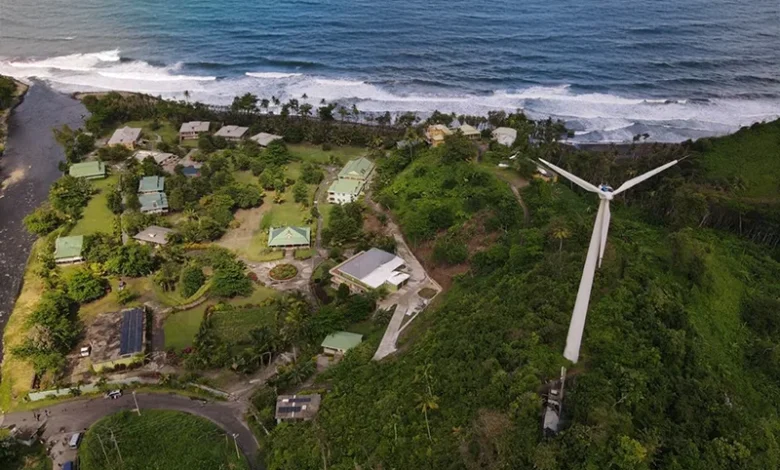Dominica Renewable Energy

Dominica’s Renewable Energy initiatives are central to the nation’s vision of achieving energy independence and sustainability. Known as the “Nature Island of the Caribbean“, Dominica leverages its abundant natural resources—geothermal, hydroelectric, solar, and wind energy—to reduce reliance on imported fossil fuels, lower energy costs, and mitigate the impacts of climate change. The goal of the Dominica government is to attain 100% renewable energy generation by 2030, positioning Dominica as a leader in sustainable development.
Dominica’s Renewable Energy Initiatives
Dominica actively invests in sustainable power projects to achieve its renewable energy goals. Central to these efforts are developments in hydroelectric power operated by DOMLEC, geothermal energy exploration, and the adoption of solar and wind technologies, all of which aim to reduce fossil fuel dependence and promote environmental sustainability.
Hydroelectric Power and DOMLEC
The Dominica Electricity Services Limited (DOMLEC) is the sole electricity utility company responsible for generating, transmitting, and distributing electricity across the island. Hydroelectric power has been a cornerstone of Dominica’s energy sector since the mid-20th century. DOMLEC operates several hydroelectric power stations:
- Trafalgar Power Station: Commissioned in 1952 and located near the Trafalgar Falls, this facility utilizes the Roseau River’s flow with an installed capacity of approximately 1.88 MW.
- Padu Power Station: Situated on the Padu River and commissioned in 1986, it has an installed capacity of about 1.6 MW.
- Laudat Power Station: Located in Laudat, this plant contributes significantly to the national grid by harnessing the Laudat River.
These hydroelectric plants collectively provide around 30% of Dominica’s electricity generation, reducing dependence on diesel generators and lowering greenhouse gas emissions.
Geothermal Energy Development and DGDC
Recognizing its volcanic origins, Dominica has substantial geothermal potential. The Dominica Geothermal Development Company (DGDC), established in 2016, is a state-owned entity tasked with tapping into and developing Dominica’s geothermal activity for sustainable energy production.
Laudat Geothermal Energy Plant
- Exploration and Development: Initial exploration began in the early 2000s, with test drilling confirming high-temperature geothermal reservoirs in the Roseau Valley, particularly around Laudat and Wotten Waven.
- Project Details: The DGDC is developing a 7 MW geothermal power plant in Laudat, expected to meet up to 50% of the island’s electricity demand upon completion.
- Funding and Support: The project has secured over US$50 million in funding from international partners, including the World Bank, Caribbean Development Bank, and the Government of New Zealand.
- Future Plans: There are intentions to expand the plant’s capacity to 20 MW and potentially export excess energy to neighboring islands via submarine cables.
Regulation by the Independent Regulatory Commission (IRC)
The Independent Regulatory Commission (IRC), established under the Electricity Supply Act of 2006, regulates Dominica’s electricity sector. Its responsibilities include:
- Licensing: Issuing licenses to electricity providers and ensuring compliance with regulatory standards.
- Tariff Setting: Reviewing and approving electricity rates to balance consumer interests with utility sustainability.
- Promoting Renewable Energy: Encouraging the integration of renewable energy sources into the national grid and fostering investment in sustainable energy projects.
The IRC plays a crucial role in overseeing DOMLEC’s operations and ensuring alignment with national renewable energy goals.
Solar and Wind Energy Adoption
While geothermal and hydroelectric power are central to Dominica’s renewable energy strategy, solar and wind energy are increasingly adopted at the private level:
-
Solar Energy:
- Residential and Commercial Installations: A growing number of households and businesses are installing solar photovoltaic systems to reduce electricity costs and enhance energy security.
- Government Initiatives: Implementation of solar street lighting and solar installations on public buildings, including schools and health centers.
-
Wind Energy:
- Private Installations: Some residences and agricultural operations have installed small-scale wind turbines, particularly in coastal and elevated areas with favorable wind conditions.
These efforts contribute to diversifying the energy mix and promoting sustainable practices among citizens.
Challenges and Future Outlook
Dominica faces challenges in fully realizing its renewable energy potential:
- Natural Disasters: The island is susceptible to hurricanes and tropical storms, which can damage infrastructure. Hurricane Maria in 2017 caused significant setbacks to energy facilities.
- Financial Constraints: High initial investment costs for renewable energy projects necessitate substantial funding and international assistance.
- Technical Expertise: Developing local expertise in renewable energy technologies requires capacity-building initiatives.
Future Plans:
- 100% Renewable Energy by 2030: The government aims to achieve complete reliance on renewable energy sources within the next decade.
- Infrastructure Resilience: Strengthening energy infrastructure to withstand natural disasters through robust design standards.
- Community Engagement: Involving local communities in renewable energy projects to foster ownership and ensure sustainability.
By pursuing these initiatives, Dominica aims to reduce energy costs, promote sustainable development, and position itself as a leader in renewable energy within the Caribbean region. The successful implementation of these projects will not only contribute to environmental preservation but also enhance energy security and economic growth for the island nation.




